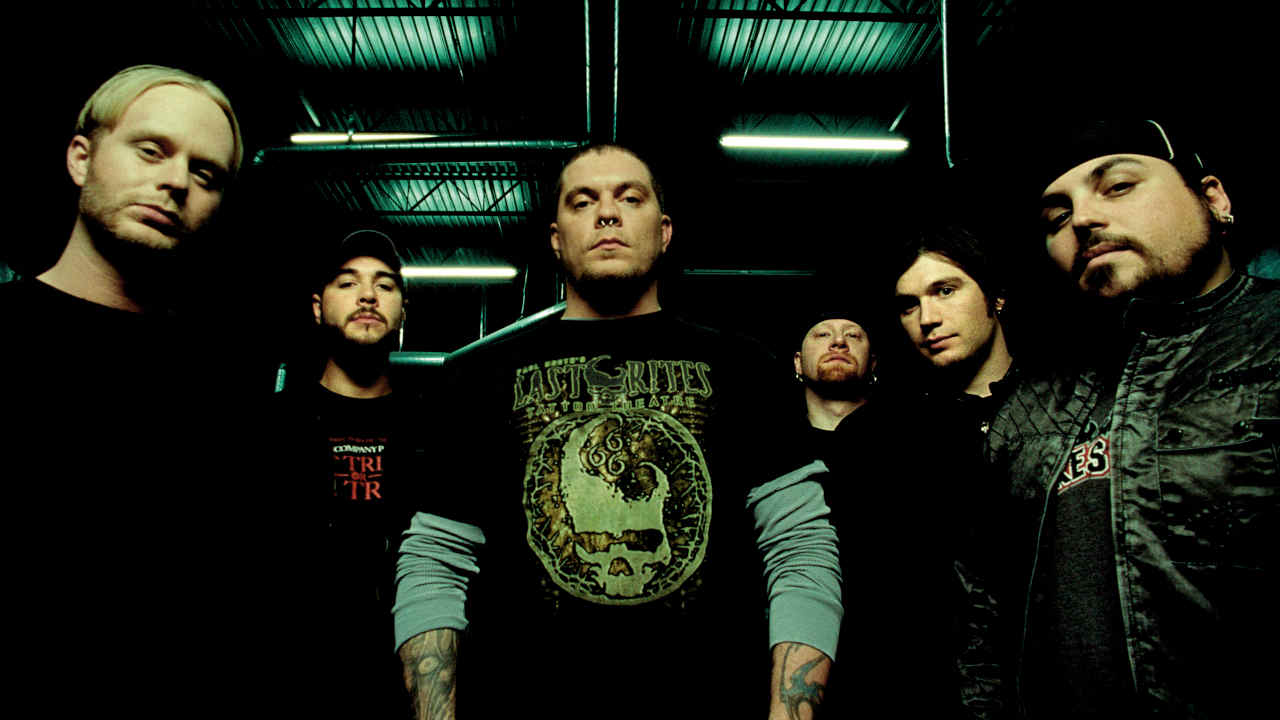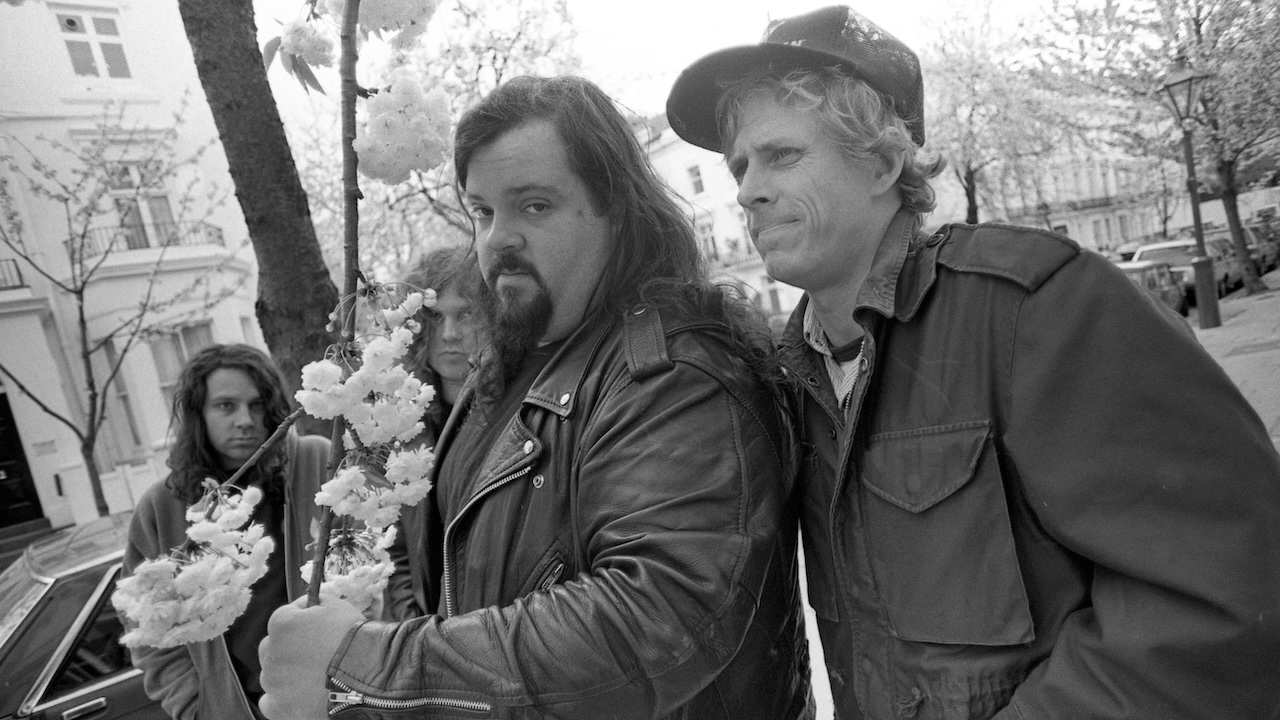“We invented the New Wave Of American Heavy Metal as a joke”: how Chimaira bounced back from the edge of oblivion with Resurrection
Chimaira helped start an entire a scene but never got the same acclaim as some of their peers. They hoped to change that with 2007’s classic Resurrection album

After a few years of internal strife, New Wave Of American Heavy Metal trailblazers Chimaira returned in 2007 with a reconfigured line-up and a new hunger with the killer Resurrection album. In this classic interview from that year, singer Mark Hunter and guitarist Matt DeVries told Metal Hammer about the frustrations that almost led to their split a few years earlier
Liars… or merely misguided ingénues? It’s one of oldest band dodges around. When an album, released with great expectations, doesn’t perform as demanded, then look for a scapegoat. Label, management, producer, drummer, goldfi sh… anything will do. Just deflect the blame.
Enter Cleveland’s Chimaira. Their self-titled 2005 record got a cruelly unfair critical and commercial mauling. Therefore, are they now trying to lick wounds by licking an unseen nemesis that’s solely responsible for the perceived failure last time out? No chance. It’s honesty all the way.
“Look, we love the Chimaira album,” insists guitarist Matt DeVries. “Sure, we were under a lot of pressure, trying to follow on from the success of The Impossibility Of Reason (2003), and maybe we were being a little too meticulous with the music, and somewhat sidetracked because we were struggling a little to make a new line-up work. But, musically, we’re proud of what we achieved back then. The problems lie in the way it was promoted, or not promoted.”
Chimaira have long been regarded as among the premier bands of the so-called New Wave Of American Metal. The combination of DeVries, fellow guitarist Rob Arnold, vocalist Mark Hunter, bassist Jim LaMarca, keyboard player Chris Spicuzza and drummer Andols Herrick hit hard with 2001’s debut Pass Out Of Existence and the subsequent …Reason. But everything got turned on its head when Herrick quit in 2003 because he couldn’t take the touring regime any more. All of which brought in former Soilwork drummer Richard Evensand, for a brief, explosive tenure.
“Let’s just say that things didn’t work out, and leave it at that,” says the diplomatic DeVries.
Oh yeah? Hunter has no such qualms in explaining where the problem lies.
Sign up below to get the latest from Metal Hammer, plus exclusive special offers, direct to your inbox!
“Richie was Dr Jekyll and Mr Hyde. He could be the nicest guy in the world one minute, and then turn into a fucking freak the next.”

So, enter Kevin Talley, who played on the Chimaira album. He proved to be difficult in his own right. Again, over to Hunter…
“This wasn’t another situation like Richie, but I had real issues with Kevin. At the time of the last album, I had a lot on my mind, trying to deal with a lot of shit that was going down with the band. There were cracks starting to appear for the fi rst time in our relationships on the road. I would have arguments with Matt and Jim, and Kevin would take their side, which really irritated me. So, we weren’t getting along. I wasn’t in the mood, so Kevin and I clashed a lot.”
As Hunter now admits, things were getting very fractious, to the point where Chimaira almost fell apart. And he readily accepts some of the blame.
“We were still giving everything onstage, but I know that I was in a bad place. I was drinking before going onstage, which I never did before. And I was also trashing the equipment. I think it’s fair to say that Matt, Rob and I, at different times, each wondered whether there was any reason to carry on. And then one day, I can’t tell you exactly when, I realised where the real problems were, and what we had to do.”
Refreshed by this epiphany, Hunter – very much the leader of the band – started to clean up his house.
“I realised that I had to stand up and do what was necessary to save this band. I’d been dodging my responsibility as the guy everyone looked to for guidance. It was time to take control again. First thing we needed to do was change labels. Now, I love a lot of the people at Roadrunner, who put out the first three records, but we were getting little support from them on the Chimaira campaign. Fortunately, they agreed to let us go.
“Then it was time to deal with Talley! We were lucky in that, at the end of 2005, Andols played at the Roadrunner United show in New York (celebrating the company’s 25th anniversary). I asked people whose opinion I trusted what they thought of his performance, and they thought he was really kicking. In fact, I gather when someone asked him whether he regretted leaving the band, his response was to sing Cher’s If I Could Turn Back Time! So, I called Andols up and asked if he’d like to come along and jam with us when Kevin wasn’t around. That clinched it. I then phoned up Kevin and explained he was out, but that we wanted to do things amicably.I’m prepared to accept that the troubles weren’t entirely down to him… we all have to share the blame.”
Free of the immediate problems, the revitalised band started to write songs again.
“Suddenly, the pressure was off,” exclaims DeVries. “We could be ourselves, and go wherever we wanted musically. We did all of the writing without a record deal, and having Andols back gave us a unity again. This time, we all got involved a lot more. And I started noticing we were ripping ourselves off. How cool was that? In the past, there would be a riff that was pure Sepultura. Now I was hearing our own stuff coming back at us. Finally, it was like we had our own identity.”
Taking their time, the band signed to Nuclear Blast in Europe and Ferret in America. “We could have picked up a deal immediately,” interjects DeVries, “but wanted to wait until we had the record written. That way there could be no interference.”
They chose to work with producers Jason Suecof and Andy Sneap on the most crucial record of their career, the aptly titled Resurrection. “We love what people like Colin Richardson and Ben Schigel have given us in the past,” says the guitarist. “But we’re all fans of Andy Sneap, and what metal band would pass on the chance to record with him? As, for Jason…well, Mark worked with him on the song The Enemy from the Roadrunner United album, and loved what he did with his vocals…
“He’s almost a fucking musical genius,” shouts Hunter. “He’s got his own band, Crotchduster, whose style is crazy. That’s one of the things which attracted us. He writes songs that are two minutes long, and others which stretch out to 10 minutes. Mind you, not everything about working with him is easy. He’d go missing in action! Seriously, he wouldn’t turn up at the studio, and nobody knew where he was.”
Suecof also had an annoying habit about being right without having a clue about the background to an idea. Hunter can barely contain his amusement.
“He came in one day when Rob was playing a riff, and told him to cut the thing in half. Rob was furious, because Jason hadn’t been around to hear the whole idea – just that little bit. At first he refused, but I convinced him to try it Jason’s way – you know what, it worked! The guy just has ability to make instant judgements, and more often than not, they improve things. He also pushed me so hard. I’d do a vocal take, and he’d force me to do it again. Jason and Andy got an extra fi ve per cent out of us and that’s what made the difference.”
Ironically, the most confrontational album of Chimaira’s career has happened because they were so relaxed and in focus.
“Can you believe we came up with our most brutal, although diverse, album through smiling and laughing?” laughs DeVries. “If we ever get depressed, we’ll probably do an acoustic album.”
“It was like doing our debut all over again,” concurs Hunter. “As long as we were satisfied, nothing else existed. But that comes from having belief, and that’s something I have more than anyone. My philosophy is I make mistakes with this band, but I’m always right!”
So, where does Resurrection put Chimaira in relation to their New Wave Of American Metal peers? DeVries laughs at the whole concept.
“We invented this genre! A long time ago, as a joke, we did t-shirts with our name in the style of the Iron Maiden logo, and the legend ‘New Wave Of American Heavy Metal’ on the back. It was inspired by the New Wave Of British Heavy Metal. It was meant to be fun. Now everyone regards it as something serious. Do we have anything to prove? Only to ourselves.”
Besides, whatever the symbolic explanations behind the Resurrection title, these boys just wanna have fun.
“We did a very serious, almost reality TV, DVD with The Dehumanizing Process (released in 2004),” concludes DeVries. “But is that what fans need? If we ever do another DVD it’ll be inspired by Mötley Crüe – lots of sex, drugs and insanity. And that’s what we’ve now got back – a love for the music.”
Resurrection’ is not just one of the most important metal albums of the 2007, it’s given Chimaira a renewed thirst for doing what they do best. Hallelujah – and pass the bottle.
Originally published in Metal Hammer issue 163
Malcolm Dome had an illustrious and celebrated career which stretched back to working for Record Mirror magazine in the late 70s and Metal Fury in the early 80s before joining Kerrang! at its launch in 1981. His first book, Encyclopedia Metallica, published in 1981, may have been the inspiration for the name of a certain band formed that same year. Dome is also credited with inventing the term "thrash metal" while writing about the Anthrax song Metal Thrashing Mad in 1984. With the launch of Classic Rock magazine in 1998 he became involved with that title, sister magazine Metal Hammer, and was a contributor to Prog magazine since its inception in 2009. He died in 2021.

